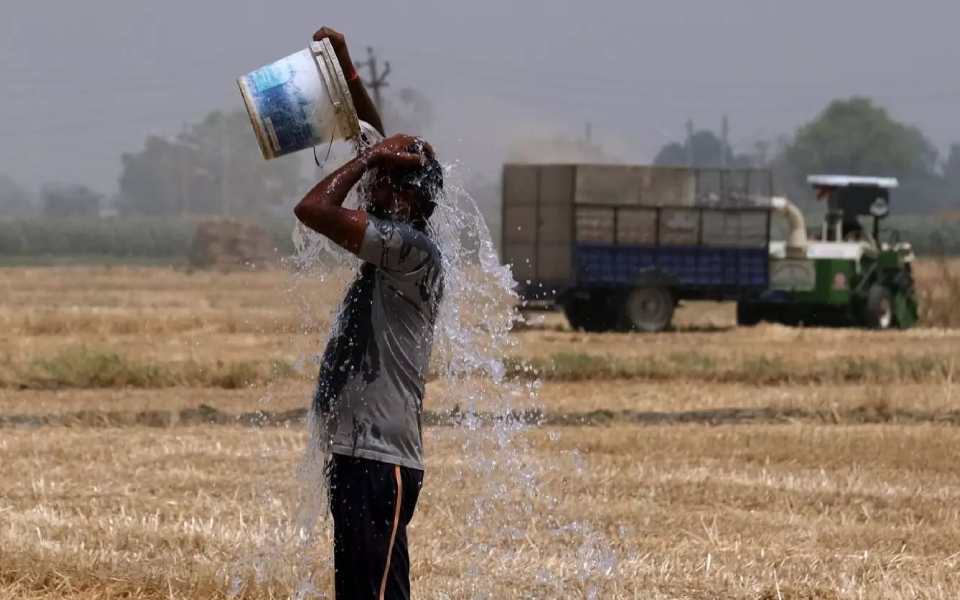The scorching summer heat has descended upon the state, leaving its residents reeling under its oppressive grip. The onset of heatwaves has particularly impacted manual laborers, drivers, and unprotected commuters, subjecting them to the relentless rays of the sun. With temperatures soaring 2-3 degrees Celsius above normal in North Interior, South Interior, and Coastal regions, the Indian Meteorological Department (IMD) has sounded an alarm, forecasting a prolonged period of heightened temperatures from April through May.
In the capital city of Bengaluru, where extreme temperatures have persisted over the last three days, the public finds itself drained and fatigued by the unyielding heat. Reluctance to venture outdoors prevails as the absence of rainfall exacerbates the situation. According to data released by the IMD, this year's temperatures mark a five-year high, with April 3rd recording a staggering 37°C, the highest in recent memory.
Amidst the sweltering conditions, the climate forecast paints a grim picture, predicting heatwaves lasting anywhere from 2 to 14 days across the state. Recognizing the imminent threat posed to human and animal welfare, the Revenue Department has issued crucial guidelines aimed at mitigating the adverse effects of the extreme heat. This move comes in the wake of 223 taluks being declared drought-hit, underscoring the urgency of the situation.
ALSO READ: Temperature soars in Karnataka: Kalaburagi records 41.6 degrees Celsius
The guidelines advocate for prudent measures to combat the heat, including avoiding outdoor activities during peak hours (12 PM to 3 PM), ensuring adequate hydration through regular water intake, and donning light-colored clothing, sunglasses, and headgear when venturing outside. Additionally, the public is advised to refrain from consuming dehydrating beverages such as alcohol, tea, coffee, and carbonated drinks, opting instead for hot foods to maintain hydration levels.
To safeguard vulnerable populations, particularly children and pets, from the dangers of overheating, strict precautions are advised. Never leaving them unattended in parked vehicles, providing ample shade and hydration, and seeking immediate medical attention in case of fainting or illness are emphasized in the guidelines.
For those already succumbing to the heat's onslaught, the guidelines prescribe prompt action, including relocating the individual to a shaded area, administering rehydrating solutions like ORS or lemonade, and seeking medical assistance if symptoms persist or worsen.
In a concerted effort to preemptively address the challenges posed by heatwaves, the guidelines underscore the importance of infrastructure and community support. This includes ensuring access to drinking water in heat-prone areas, erecting shades in public spaces, stocking essential veterinary medicines, and disseminating information to tourists and religious devotees about the extreme temperatures.
Moreover, contingency plans, such as water supply through tankers and borewells, are already in place and ready to be implemented as needed. Regulatory measures, such as weekly meetings of the District Disaster Management Authority and taluk-level task force committees, aim to facilitate coordinated responses to the evolving situation.
In addition to individual preparedness, the guidelines stress the importance of institutional readiness, with hospitals, industries, and public spaces undergoing rigorous fire safety audits and emergency response training to mitigate potential risks.
As the state braces itself for the relentless onslaught of summer heat, adherence to these guidelines becomes imperative to safeguard lives and livelihoods alike. With proactive measures and community resilience, the hope remains to weather this heatwave season with minimal casualties and maximum preparedness.
Let the Truth be known. If you read VB and like VB, please be a VB Supporter and Help us deliver the Truth to one and all.
Panaji (PTI): As part of a crackdown against tourist establishments violating laws and safety norms in the aftermath of the Arpora fire tragedy, Goa authorities on Saturday sealed a renowned club at Vagator and revoked the fire department NOC of another club.
Cafe CO2 Goa, located on a cliff overlooking the Arabian Sea at Vagator beach in North Goa, was sealed. The move came two days after Goya Club, also in Vagator, was shut down for alleged violations of rules.
Elsewhere, campaigning for local body polls, AAP leader Arvind Kejriwal said the fire incident at Birch by Romeo Lane nightclub at Arpora, which claimed 25 lives on December 6, happened because the BJP government in the state was corrupt.
An inspection of Cafe CO2 Goa by a state government-appointed team revealed that the establishment, with a seating capacity of 250, did not possess a no-objection certificate (NOC) of the Fire and Emergency Services Department. The club, which sits atop Ozrant Cliff, also did not have structural stability, the team found.
The Fire and Emergency Services on Saturday also revoked the NOC issued to Diaz Pool Club and Bar at Anjuna as the fire extinguishers installed in the establishment were found to be inadequate, said divisional fire officer Shripad Gawas.
A notice was issued to Nitin Wadhwa, the partner of the club, he said in the order.
Campaigning at Chimbel village near Panaji in support of his party's Zilla Panchayat election candidate, Aam Aadmi Party leader Kejriwal said the nightclub fire at Arpora happened because of the "corruption of the Pramod Sawant-led state government."
"Why this fire incident happened? I read in the newspapers that the nightclub had no occupancy certificate, no building licence, no excise licence, no construction licence or trade licence. The entire club was illegal but still it was going on," he said.
"How could it go on? Couldn't Pramod Sawant or anyone else see it? I was told that hafta (bribe) was being paid," the former Delhi chief minister said.
A person can not work without bribing officials in the coastal state, Kejriwal said, alleging that officers, MLAs and even ministers are accepting bribes.





